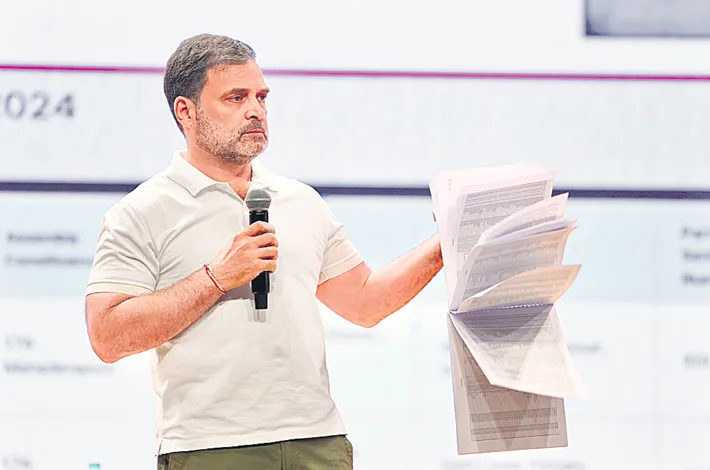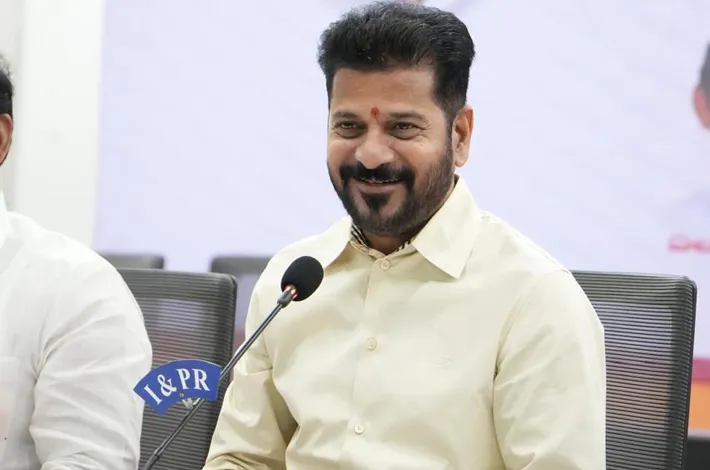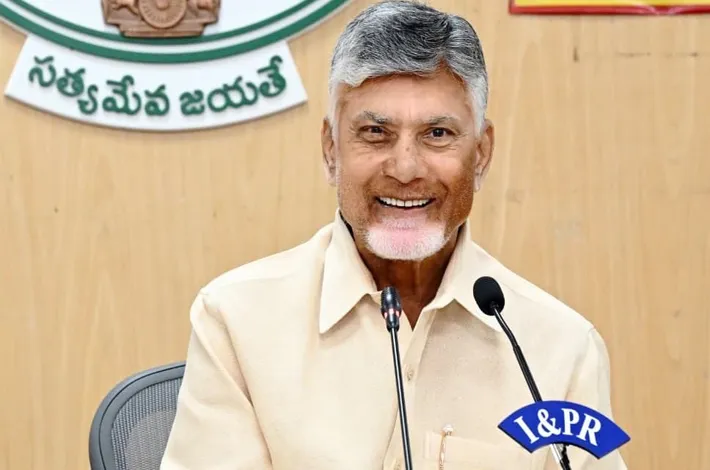stolen votes
08-08-2025 12:00:00 AM

Addition, Subtraction, Suppression of Votes
Rahul accuses ECI of colluding with BJP
■ NDA this term is due to voters’ manipulation
■ Claims massive theft of votes in Karnataka's Mahadevapura segment
■ In Maharashtra, Gandhi alleged that one crore new voters were added to electoral rolls between the Lok Sabha and assembly elections in 2024
■ The ECI is deliberately providing non-machine-readable papers to prevent scrutiny
■ Modi needed to steal 25 seats to stay in power
metro india news I new delhi
For the first time in the annals of country’s independence and what seems to be like a seismic moment for Indian democracy, Congress MP and Leader of the Opposition Rahul Gandhi has levelled explosive allegations of large-scale voter manipulation in the 2024 Lok Sabha elections and subsequent state assembly polls, accusing the Election Commission of India (ECI) of colluding with the ruling Bharatiya Janata Party (BJP) to orchestrate a "massive theft" of votes.
In a press conference on here on Thursday, Rahul Gandhi presented a meticulously prepared PowerPoint backed by data sourced from the ECI itself, alleging that fraudulent voter lists enabled the National Democratic Alliance (NDA) to secure a third term at the Centre and maintain power in states like Karnataka, Maharashtra, and Haryana. These accusations, supported by granular evidence, have sparked a firestorm of debate, raising profound questions about the integrity of India’s electoral process.
Rahul Gandhi’s allegations center on the Mahadevapura assembly segment in Karnataka’s Bangalore Central Lok Sabha constituency, where he claims a staggering 1,00,250 votes were "stolen" out of 6.5 lakh total votes. According to Congress’s internal research, this manipulation involved five distinct methods: 11,965 duplicate voters, 40,009 fake or invalid addresses, 10,452 bulk voters registered at single addresses, 4,132 voters with invalid photos, and 33,692 instances of misuse of Form 6, meant for new voter registrations.
In Bangalore Central, the 2024 Lok Sabha polls saw a tight race, with BJP’s PC Mohan narrowly defeating Congress’s Mansoor Ali Khan by 32,707 votes (6,58,915 for BJP vs. 6,26,208 for Congress). Rahul Gandhi highlighted that while Congress won six of the seven assembly segments, the BJP’s massive 1,14,046-vote lead in Mahadevapura tipped the scales, securing the Lok Sabha seat. “This seat won them the election,” Gandhi asserted, describing the irregularities as a “crime against the Indian Constitution and the Indian flag.”
The Congress leader’s claims extend beyond Karnataka. In Maharashtra, Gandhi alleged that one crore new voters were added to electoral rolls between the Lok Sabha and assembly elections in 2024—a figure he claims exceeds the voter additions over the previous five years and even surpasses the state’s population growth. He pointed to a suspicious spike in voter turnout after 5 p.m., which coincided with the opposition Maha Vikas Aghadi’s (MVA) crushing defeat in the state assembly polls, where it secured only 50 of 288 seats compared to the Mahayuti coalition’s 235. In the Lok Sabha polls, the MVA had performed strongly, winning 30 of 48 seats, making the assembly election reversal starkly anomalous.
Gandhi’s critique also targets the ECI’s operational transparency, particularly its refusal to provide voter lists in machine-readable formats. He described the laborious process of manually analyzing “seven feet of paper” to uncover irregularities, a task that took six months but could have been completed in “30 seconds” with digital data. “The ECI is deliberately providing non-machine-readable papers to prevent scrutiny,” Gandhi charged, suggesting that accessible data would expose widespread fraud. He further accused the ECI of destroying CCTV footage and altering polling schedules in states like Haryana and Karnataka, moves he deems suspicious and indicative of a “choreographed” electoral process.
The ECI’s lacklustre response has been swift but defensive. Karnataka’s Chief Electoral Officer demanded that Gandhi submit a signed affidavit detailing his allegations, as required under the Registration of Electors Rules, 1960. The ECI has also pointed out that Gandhi failed to respond to a June 2025 letter inviting discussion on his earlier claims of rigging in Maharashtra, questioning whether his accusations are “baseless.” The poll body emphasized that electoral rolls are prepared transparently under the Representation of the People Act, 1950, and shared with all political parties, including Congress, which filed only eight election petitions nationwide after the 2024 Lok Sabha polls.
Gandhi’s allegations are bolstered by broader electoral trends that defy conventional logic. He noted that while anti-incumbency typically affects all parties in democratic systems, the BJP appears immune, consistently defying exit polls and internal surveys. In Haryana, exit polls predicted a Congress victory, yet the BJP retained power with a narrow 22,779-vote margin in key constituencies. Similar discrepancies in Madhya Pradesh and Maharashtra have fueled suspicions, with Gandhi alleging that the BJP’s narrow victories in 25 Lok Sabha seats by margins under 33,000 votes were critical to Prime Minister Narendra Modi’s third term. “Modi needed to steal 25 seats to stay in power,” he claimed, suggesting a targeted manipulation strategy.
The BJP and its allies have dismissed Gandhi’s claims as “baseless” and a deflection from Congress’s electoral failures.
But yet, Gandhi’s evidence has struck a chord, particularly as the ECI has not outright dismissed his Mahadevapura findings as misleading, instead requesting a formal oath to proceed with an investigation. This departure from previous rebuttals suggests a level of credibility to Congress’s data, which Gandhi claims is drawn directly from ECI records. Posts on X reflect growing public skepticism, with users like
@INCIndia and @shaandelhite
amplifying Gandhi’s charge of systemic fraud, though these remain inconclusive without further verification.
The implications of Gandhi’s allegations are profound. If substantiated, they could unravel public trust in India’s electoral framework, already strained by concerns over electronic voting machines and multi-phase polling. The Congress’s planned protest march in Karnataka, led by Gandhi, signals an escalating confrontation with the ECI and the BJP. The judiciary, as Gandhi urged, may need to intervene to restore faith in the democratic process. For now, the nation watches as the ECI faces pressure to address these allegations transparently—or risk deepening a crisis of confidence in the world’s largest democracy.








